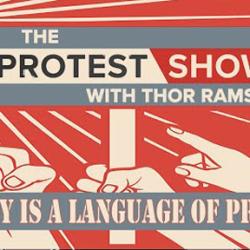 The Big Picture Podcast 47: 21st Century Lessons from Abraham, Lot & Jonah Play Now | Play in Popup | Download
The Big Picture Podcast 47: 21st Century Lessons from Abraham, Lot & Jonah Play Now | Play in Popup | DownloadWelcome to the Big Picture Podcast. I’m Joel Fieri, and this podcast seeks to begin, and hopefully sustain, a conversation about current trends, ideas and issues in the Church and greater society.
And it’s the greater society that I want to focus on today, and to do that I think it’s time to once again get in touch with my inner “Backrow Baptist” and let you know what he sees from The Back Pew. And again, most of know a BRB, he’s the shy guy in the back of the church who not only sings off-key, but is really uncomfortable with all the passionate love songs to Jesus.
But as I always say, he’s a good Christian guy who sees a lot of things that folks in the front rows miss.
And what I’m seeing, and sensing in Christian circles is a lot of frustration and even despair from Christians today as we see our influence in our culture waning as we enter a “post Christian” society.
And there’s good reason to despair, as we see so many of the values and institutions that Christians have held so dear just crumbling before our very eyes. For most of my life this has been predicted by many Christian leaders who were either ignored or pooh-poohed. Many people agreed, but there were too many other things going on in our free society to worry about it.
But now it’s here, folks. We have a society and nation that are becoming hostile to our faith and values, which is discouraging and frustrating enough. But there’s also a growing hostility to us as Christians, and even the very notion that there’s a God out there or up there somewhere that we’re accountable to.
So how do we react to all this? How do we deal with the frustration and discouragement that comes from seeing the decline of what’s so precious to us?
Well there’s a couple ways I see us going. There are maybe a few of us who are tempted to “call down fire from heaven” on our wicked nation, just like Jesus’ disciples wanted to do when Jesus was rejected.
But I think for most of us, the tendency and temptation is to just give up, because we see the good failing, while “the wicked are prospering”, just like some verses expressed in Psalms and the Book of Jeremiah.
But since neither of these options got the okay from God or Jesus, that leaves the very relevant and timely question of “How do we react as Christians towards a culture that is running from God and towards evil”?
The way I figure it, we have three options, and each one is represented by an Old Testament character: We can either be a Jonah, a Lot, or an Abraham.
In the book of Jonah, Jonah was told by God to go to a really wicked place, Ninevah, and tell them to repent or face judgement. Well, Jonah didn’t like Ninevah. Nobody liked Ninevah. From what we know now, Ninevah was as wicked a place as could possibly exist. So Jonah went the other way. He didn’t want Ninevah to be saved, and I really can’t blame him. Except that God commanded him to go, and when God commands, you go. Otherwise you end up in a whale’s gut, are vomited out, and you have to go anyways. So Jonah eventually went, and low and behold, Ninevah did repent, for a time.
Now later in the Bible we see that it didn’t last and eventually the city was destroyed. So even though Jonah was ultimately right about Ninevah, their fate wasn’t his call. It was God’s. Reluctantly, covered in whale puke, Jonah obeyed.
Now Lot, on the other hand, didn’t seem to have much of a problem with wicked cities. When given the option, he chose to live closer and closer to Sodom and Ghomorrah until he was literally on their City Council, right in the middle of their wickedness. Maybe Lot was thinking he could save the people of Sodom by engaging them and being relevant to their culture, to be “in Sodom but not ‘of Sodom’”. If so, then his character wasn’t nearly strong enough to pull it off, and by the time God sent angels to save him and his family from Sodom’s destruction, he was in way too deep, and the men of Sodom didn’t have any respect for him. He barely escaped, losing his wife and pretty much destroying any kind of normal family tree he might have had.
His uncle Abraham, on the other hand, stayed obedient to God and resisted Sodom’s allure, and because of that he was able, when the time came, to at least get in God’s ear to try to save Sodom. Of course he couldn’t save Sodom, and he knew it. Abraham knew there weren’t even ten righteous men in Sodom, otherwise he wouldn’t have been bargaining God down.
Sodom, like Ninevah, wasn’t save-able.
Now, we can take heart in a couple of things: First, our culture isn’t anywhere near as bad as Ninevah and Sodom were, and they both had a chance to survive, however slim. And secondly, there are far more than ten righteous people left in America, which is why we shouldn’t despair just yet that our culture is turning its back on God.
And besides, what our mission really is, is to be salt and light in a tasteless and dark world that, in the end, is also un-savable.
Jeremiah and the Psalmist, a guy named Asaph, both concluded that the wicked may seem like they are prospering, and maybe for a time they really are. But in the end, for them it’s ruin and destruction. And so it is for this sinful and broken world.
So I’m taking my cue from Abraham, and a little bit from Jonah, and I’m taking a big warning from Lot.
I won’t go along with Sodom. Too many of our Christian brothers and sisters today are following the path of least resistance with the world, trying hard to remain relevant in hopes that the world will eventually accept a message from them that it considers irrelevant at best. Like Lot, my fear is that these Christian will one day be faced with a mob of Sodomites, figuratively and maybe even literally, out side their doors seeking to defile what they know is Holy.
When we see the wicked prospering, when so many forces that have been trying for so long to undermine our profoundly good Judeo-Christian society, a society that has blessed so many of it’s own people and those around the world for so long, are winning, we can know that it’s only for a time, and that justice in the end will come.
And like Abraham, we can intercede with God on behalf of our country, asking Him to hold off His judgement on behalf of the righteous and faithful that still remain.
And like Jonah, we can, reluctantly, without the whale puke, obey God’s command to go out into our society and be salt and light, bringing a message of hope and repentance. Because their fate is God’s call. Obedience to His commands is ours.
Additionally, I want to bring to light the story that inspired “The End of the Spear” and the modern-day heroes who played a part in saving generations to come, both spiritually and physically.
There were five American Christian missionaries whose goal was to evangelize the Waodani people of the jungle of Ecuador. The Waodani were also known as “The Savages”, as they were an isolated tribe known for their incredible acts of violence against both their own people and any outsiders who entered their territory.
The the intentions of being the first Christians to ever reach the Waodani, the missionaries began making regular flights over the Waodani settlements in September, 1955, dropping gifts.
After several months of exchanging gifts, the Americans set up a camp just a few kilometers from the Waodani settlements.
But their efforts came to a violent end on January 8, 1956, when all five men: Jim Elliot, Nate Saint, Ed McCully, Peter Fleming, and Roger Youderian were attacked and speared by a group of Waodani warriors.
The news of their deaths was broadcast worldwide. This event galvanized the missionary efforts throughout the United States, sparking an outpouring of funding for evangelism efforts all around the world.
Several years after their deaths, Jim Elliot’s widow, Elizabeth, and Rachel Saint, Nate’s sister, returned to Ecuador as missionaries – actually living among the Waodani.
This eventually resulted in the conversion of many, even including some of the men involved in their husbands’ murder.
And, more to God’s glory, some of the Waodani even became missionaries themselves, called to spread God’s Word (or “carvings”) to those who hadn’t yet heard.
All this also led to the earthly salvation of the Waodani tribe, which at the time was dying out. Prior to the missionary trips, half of the Waodani deaths were results from murders at the hands of their fellow tribesmen. From only 600 Waodani alive in 1958, the tribe has grown to over 2,000 people today, with as many as 40% of them professing to be Christians.
You see, God’s ways are definitely not our ways. From the unimaginable pain and terror these men endured in death, and grief of their family and friends, has come salvation – not only for the savage Aucas, but also for millions around the world who have benefitted from the sacrifice and faithfulness of those five men, which inspired so much missionary zeal to spread “God’s Carvings” to the ends of the earth.













